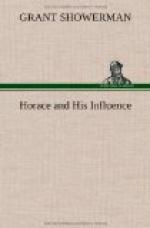And there is a corollary to Horace’s frankness that constitutes another element in the charm of his personality. His very unreserve is the proof of an open and kindly heart. To call him a satirist at all is to necessitate his own definition of satire, “smilingly to tell the truth.” At least in his riper work, there is no trace of bitterness. He laughs with some purpose and to some purpose, but his laughter is not sardonic. Sane judgment and generous experience tell him that the foibles of mankind are his own as well as theirs, and are not to be changed by so slight a means as a railing tongue. He reflects that what in himself has produced no very disastrous results may without great danger be forgiven also in them.
It is this intimate and warming quality in Horace that prompts Hagedorn to call him “my friend, my teacher, my companion,” and to take the poet with him on country walks as if he were a living person:
Horaz, mein Freund, mein Lehrer, mein
Begleiter,
Wir gehen aufs Land. Die Tage sind
so heiter;
and Nietzsche to compare the atmosphere of the Satires and Epistles to the “geniality of a warm winter day”; and Wordsworth to be attracted by his appreciation of “the value of companionable friendship”; and Andrew Lang to address to him the most personal of literary letters; and Austin Dobson to give his Horatian poems the form of personal address; and countless students and scholars and men out of school and immersed in the cares of life to carry Horace with them in leisure hours. Circum praecordia ludit, “he plays about the heartstrings,” said Persius, long before any of these, when the actual Horace was still fresh in the memory of men.
If we were to take detailed account of certain qualities missed in Horace by the modern reader, we should be even more deeply convinced of his power of personal attraction. He is not a Christian poet, but a pagan. Faith in immortality and Providence, penitence and penance, and humanitarian sentiment, are hardly to be found in his pages. He is sometimes too unrestrained in expression. The unsympathetic or unintelligent critic might charge him with being commonplace.
Yet these defects are more apparent than real, and have never been an obstacle to souls attracted by Horace. His pages are charged with sympathy for men. His lapses in taste are not numerous, and are, after all, less offensive than those of European letters today, after the coming of sin with the law. And he is not commonplace, but universal. His content is familiar matter of today as well as of his own time. His delightful natural settings are never novel, romantic, or forced; we have seen them all, in experience or in literature, again and again, and they make familiar and intimate appeal. Phidyle is neither ancient nor modern, Latin nor Teuton; she is all of them at once. The exquisite expressions of friendship in the odes to a Virgil, or a Septimius, are applicable to any age or nationality, or any person. The story of the town mouse and country mouse is always old and always new, and always true. Mutato nomine de te may be said of it, and of all Horace’s other stories; alter the names, and the story is about you. Their application and appeal are universal.




